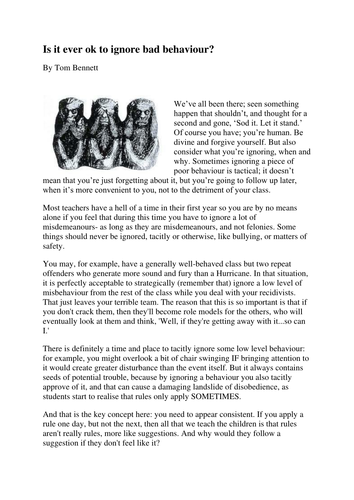
Some thoughts about when ignoring bad behaviour is done for the right reasons- tactical ones- and when it isn’t.
Something went wrong, please try again later.
Tom writes about recidivists. My dictionary describes a recidivist as 'a convicted criminal who reoffends, especially repeatedly' and I am concerned that this term is used to describe children who can't/won't follow the rules. Such children are rarely criminals (convicted or otherwise) and, more often than not, their behaviour is the result of a complex web of interrelated factors (child / family / peers / teacher / curriculum). We can seek to understand the real situation or return to the behaviour management approaches of yesteryear so beautifully described by George Orwell in 'The Clergyman's Daughter': "You mustn't treat them like human beings. You must treat them like animals - driving, not persuading. Before all else, you must teach them that it is more painful to rebel than to obey."
Tom writes good sense on this issue. Context is everything, though, as I am sure he would acknowledge. Younger or weaker teachers have to find ways to get the best out of classes, whilst experienced practitioners don't have to pick as many fights. the best approach is often to minimise confrontation, but if this fails then rules have to be imposed by whatever means.
Brilliant advice as always from Tom. Angels1 you're advice is more suited to a utopia. Children sometimes misbehave because ... they're children! Amazing I know, but you don't have to try and rationalise or understand selfish behaviour. why are we so quick forget to pushing boundaries is a natural part of growing up? I'll think about your advice next time I'm being verbally abused in a classroom; what was it again? Ahhh of course; look for ways to praise ... perhaps a sticker if they manage to conjugate their verbal insults correctly?
I think 'tactically ignoring' behvaiour has got itself a bad name. It is an extremely useful strategy in the classroom, but only when used haqnd in hand with a secondary strategy that does not directly address the unwanted behaviour. For example, a pupil swinging on a chair and chatting to a peer might likely respond negatively to being confronted about this behaviour, especially if they feel the need to 'save face'. However, their reaction to the question "Which section are you on" will indrectly address any behaviour, whilst avoiding the confrontation, whilst focusing on why everypone is in the room together - to complete the work. My behaviour management motto is always: Least confrontation + least intervention = best classroom management.
There are many more enlightened approaches than the ones put forward in this resource. I must agree with Angels1. Having reviewed several of Mr. Bennet's works regarding behaviour, I find his frequent referral to the need for sanctions and punishments highly disturbing in a 21st century classroom. Teachers have many more tools and if we spend more time understanding our students and actively engaging them, we don't need to emphasise punitive measures. I fear new teachers will read this and fall into bad habits which belong in the 1950's classroom, not today's.
Report this resourceto let us know if it violates our terms and conditions.
Our customer service team will review your report and will be in touch.
